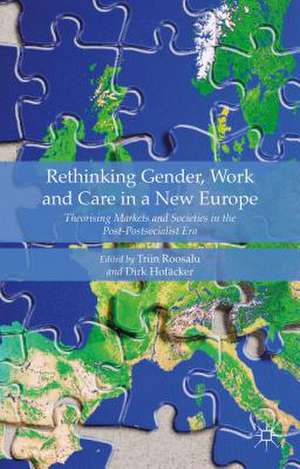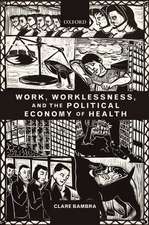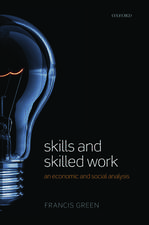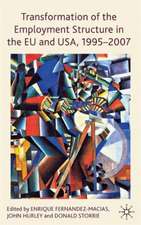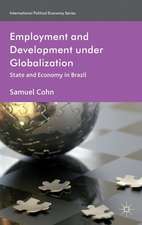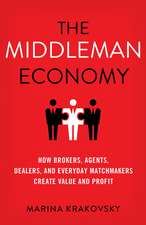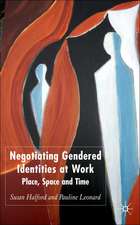Rethinking Gender, Work and Care in a New Europe: Theorising Markets and Societies in the Post-Postsocialist Era
Editat de Dirk Hofäcker Autor Triin Roosaluen Limba Engleză Hardback – 20 dec 2015
Preț: 397.01 lei
Nou
Puncte Express: 596
Preț estimativ în valută:
75.97€ • 78.87$ • 63.35£
75.97€ • 78.87$ • 63.35£
Carte tipărită la comandă
Livrare economică 24 martie-07 aprilie
Preluare comenzi: 021 569.72.76
Specificații
ISBN-13: 9781137371089
ISBN-10: 1137371080
Pagini: 384
Ilustrații: XXVIII, 388 p.
Dimensiuni: 140 x 216 x 24 mm
Greutate: 0.63 kg
Ediția:1st ed. 2015
Editura: Palgrave Macmillan UK
Colecția Palgrave Macmillan
Locul publicării:London, United Kingdom
ISBN-10: 1137371080
Pagini: 384
Ilustrații: XXVIII, 388 p.
Dimensiuni: 140 x 216 x 24 mm
Greutate: 0.63 kg
Ediția:1st ed. 2015
Editura: Palgrave Macmillan UK
Colecția Palgrave Macmillan
Locul publicării:London, United Kingdom
Cuprins
INTRODUCTION TO ANALYSIS OF POSTSOCIALIST LABOUR MARKETS
1. Investigating Women's De-Labouring in Post-Socialist European Labour Markets: Research Agenda and Theoretical Challenges; Triin Roosalu; Dirk Hofäcker
PART I: FAMILY POLICIES, NORMS AND DISCOURSES
2. Family policies in post-socialist welfare states: Where are they located in the European worlds of welfare?; Sonja Blum
3. Experts' argumenting for paternity leave: social democratic and post-socialist frames compared; Triin Roosalu; Marion Pajumets; Leeni Hansson
4. Low second birth rates in Eastern and Southern Europe: interactions between economic uncertainty and norms about parenthood; Jan Van Bavel and Joanna Ró?a?ska-Putek
PART II: PARTICIPATION IN THE LABOUR MARKET
5. Female Employment in Europe; Ursula Bazant
6. Paths and barriers to the labour market: a comparative view of working and homemaking young adult women in Hungary and Romania; Réka Geamba?u
7. Parental employment patterns in the Czech Republic: economic rationality or cultural norm?; Lenka Formánková, Blanka Plasová and Ji?í Vyhlídal
8. Gender segregation in post socialist Slovenia: women's experiences in the retail sector; Tatiana Bajuk Sen?ar
PART III: COMBINING PARENTHOOD AND PAID WORK
9. Maternal Employment in Post-socialist Countries: Understanding the Implications of Childcare Policies; Jana Javornik
10. Habits or Frames? – Explaining Patterns in the Division of Paid and Unpaid Work in Germany, Bulgaria, France and Hungary; Jan Rasmus Riebling; Rumiana Stoilova; Dirk Hofäcker
11. Childbearing behaviours of employed women in Italy and Poland; Anna Matysiak and Daniele Vignoli
12. Maternity Leave – once a Bargain, always a Bargain? Impact of Care Breaks on Mothers' Occupational Mobility: The Case of Estonia; Triin Roosalu; Kadri Täht
PART IV: OCCUPATIONAL AND SOCIAL MOBILITY
13. Gender Earnings Inequality in Central and Eastern European Countries: The Case of Dual-Earner Couples; Martina Mysíková
14. Gender gaps in participation in adult learning: Estonia compared to other European countries; Eve-Liis Roosmaa; Kadri Aavik
15. Differentiated educational pathways and gender inequalities in the Estonian labour market: what is the impact of the systemic change?; Ellu Saar; Jelena Helemäe
16. Polish women for gender equality: leaders of women's movements on problems of female employees; S?awomira Kami?ska-Berezowska
1. Investigating Women's De-Labouring in Post-Socialist European Labour Markets: Research Agenda and Theoretical Challenges; Triin Roosalu; Dirk Hofäcker
PART I: FAMILY POLICIES, NORMS AND DISCOURSES
2. Family policies in post-socialist welfare states: Where are they located in the European worlds of welfare?; Sonja Blum
3. Experts' argumenting for paternity leave: social democratic and post-socialist frames compared; Triin Roosalu; Marion Pajumets; Leeni Hansson
4. Low second birth rates in Eastern and Southern Europe: interactions between economic uncertainty and norms about parenthood; Jan Van Bavel and Joanna Ró?a?ska-Putek
PART II: PARTICIPATION IN THE LABOUR MARKET
5. Female Employment in Europe; Ursula Bazant
6. Paths and barriers to the labour market: a comparative view of working and homemaking young adult women in Hungary and Romania; Réka Geamba?u
7. Parental employment patterns in the Czech Republic: economic rationality or cultural norm?; Lenka Formánková, Blanka Plasová and Ji?í Vyhlídal
8. Gender segregation in post socialist Slovenia: women's experiences in the retail sector; Tatiana Bajuk Sen?ar
PART III: COMBINING PARENTHOOD AND PAID WORK
9. Maternal Employment in Post-socialist Countries: Understanding the Implications of Childcare Policies; Jana Javornik
10. Habits or Frames? – Explaining Patterns in the Division of Paid and Unpaid Work in Germany, Bulgaria, France and Hungary; Jan Rasmus Riebling; Rumiana Stoilova; Dirk Hofäcker
11. Childbearing behaviours of employed women in Italy and Poland; Anna Matysiak and Daniele Vignoli
12. Maternity Leave – once a Bargain, always a Bargain? Impact of Care Breaks on Mothers' Occupational Mobility: The Case of Estonia; Triin Roosalu; Kadri Täht
PART IV: OCCUPATIONAL AND SOCIAL MOBILITY
13. Gender Earnings Inequality in Central and Eastern European Countries: The Case of Dual-Earner Couples; Martina Mysíková
14. Gender gaps in participation in adult learning: Estonia compared to other European countries; Eve-Liis Roosmaa; Kadri Aavik
15. Differentiated educational pathways and gender inequalities in the Estonian labour market: what is the impact of the systemic change?; Ellu Saar; Jelena Helemäe
16. Polish women for gender equality: leaders of women's movements on problems of female employees; S?awomira Kami?ska-Berezowska
Recenzii
“This book examines issues of equal rights for parenthood in depth, by evaluating the situation in the CEE and Western European countries. The edited volume highlights the double burden of Bulgarian and Hungarian women, who still have to work in the household while also working outside of it, but also shows that being a single parent, regardless of gender, serves as a discriminatory factor in the Czech labour market.” (Arianna Radin, Work, Employment and Society, Vol. 33 (3), 2019)
"This volume stands out for addressing all the key issues of Eastern European women's employment situation and social standing in conceptually nuanced and empirically thoroughly documented ways. To find out how labor market institutions, family policies, family and work balances and occupational mobility interact for or against closing the gender gap, the authors compare the EU's new Central and Eastern European memberstates with each other as well as with the old member states. The volume makes a convincing case for taking seriously the similarities and differences in communist legacies, and in market pressures and social policy responses, and opens new avenues for cross-European comparative inquiry. For its encyclopedic coverage of relevant policy areas, country cases, and statistical and qualitative evidence, the book is an important contribution to scholarship in the field, and ought to be among the standard readings of university courses in studies of gender, labor markets, and social policy." - Béla Greskovits, Central European University, Hungary
"This highly informative and original volume gives a systematic and up-to-date overview over life courses and employment trajectories of women in a wide range of European countries, with a special focus on East Central Europe. How have East Central European societies navigated the double challenge of a major crisis of labor markets and the dismantling of existing social and family policies after the breakdown of socialism, and what has this done to female labor power? How far do concepts and theories developed for the Western context travel to the East, and where do we need to re-think Western experiences on the basis of East European developments? Does it makes sense to speak of a post-socialist model of female employment trajectories or do we rather see a variety of experiences, spanning Europe as a whole? The volume answers these questions with thorough empirical analyses, rich comparisons, and innovative theoretical concepts. The result is a must read for students of labor markets, social policy and gender politics." - Dorothee Bohle, Central European University, Hungary
"This book gives a much more nuanced view of women in post-communist labor markets than previous studies. By comparing post-communist countries from Central Europe and the former Soviet Union with West European countries, it shows,for example, that the differences between post-communist countries is often greater than differences between post-communist and West European countries. Case studies of individual post-communist countries also show that it is too simple to claim that women were winners or losers during the transformation process as different groups of women have fared differently." - Steven Saxonberg, Institute of International Relations, Czech Republic, and Dalarna University College, Sweden
Notă biografică
Triin Roosalu is Associate Professor and Researcher at the Institute of International and Social Studies, Tallinn University, Estonia.
Dirk Hofäcker is Professor of Quantitative Social Research Methods at the Department of Educational Sciences, University of Duisburg-Essen, Germany. He specializes in internationally comparative social research.
Dirk Hofäcker is Professor of Quantitative Social Research Methods at the Department of Educational Sciences, University of Duisburg-Essen, Germany. He specializes in internationally comparative social research.
Textul de pe ultima copertă
Given the growing importance of Eastern European countries in the development of the EU, there is an urgent need to reconstruct the recent dynamic developments in women's work and care in these societies, and the socio-political determinants thereof. Considering their specific cultural, economic and historical development, it can be assumed that the trends and determinants of women's labour market trajectories in CEE countries differ significantly from those in the other European countries that have frequently made up the basis for established theories in social and labour market research. This being the case, can 'standard' theoretical approaches, mostly modelled on evidence from Western Europe, be transferred to the analysis of Eastern European countries? This edited collection scrutinises pivotal aspects of women's careers in Eastern Europe, providing a detailed overview of trends and determinants of women's employment in Eastern Europe, and reflecting critically on theoretical approaches in social and labour market research.
